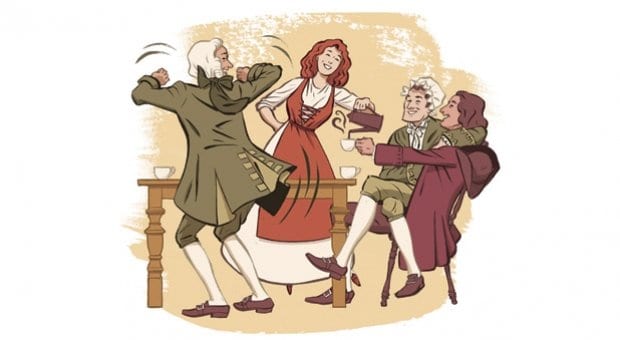My roommate, a queer, trans-identified guy, recently watched an episode of 1 Girl 5 Gays during a cable trial. The show is pretty self-explanatory: a straight woman lords over a rotating panel of five gay guys who dish on pop culture and sex. My roommate was confounded by the content but more so the dynamic. “Why are gay men so obsessed with straight women?” he asked, citing diva worship, celebrity culture and fag hags.
While the terminology — describing a woman who loves gay men — is contentious, fag hags have a historical precedent.
In the early 1700s, a married woman named Margaret Clap, affectionately referred to as Mother Clap, owned a popular gay establishment in London. Mother Clap kept a “molly house,” catering to dozens of men every night and even more on Sundays. Though she served alcohol, probably fetched from a neighbouring tavern, her house was likely a private residence or coffee house, a place for sex and socializing rather than a bar or brothel.
In the main room she served drinks, and there were beds in all the other rooms. “The Chapel,” or “The Marrying Room,” was a popular feature: a room on the main floor with a large bed, overseen by a man known as Eccleston. There was a door, but it was often left open so others could observe the “marrying.”
While little is known about Mother Clap’s early life, it’s clear she was lovingly committed to her patrons. One story describes her joking about testifying at the trial of a man named Derwin, who was up on charges of “sodomitical practices.” She swore to Derwin’s “good character,” which so confused the magistrate Derwin was acquitted.
Most of what’s known about Mother Clap comes from court transcripts. In Mother Clap’s Molly House, historian Rictor Norton painstakingly reconstructs her downfall, at the hands of a spurned lover turned police informant. He brought a constable of the Society for the Reformation of Manners — a faction of zealous Christian moral crusaders — into Mother Clap’s, and the agent provided evidence against the matron and her patrons. A raid was organized and took place in February 1726. In the ensuing trials, the society’s agent described how the mollies would sit in each others’ laps, “kissing in a lewd Manner, and using their Hands indecently. Then they would get up, Dance and make Curtsies, and mimic the voices of Women. ‘O, Fie, Sir! — Pray, Sir. — Dear Sir. Lord, how can you serve me so? — I swear I’ll cry out. — You’re a wicked Devil. — And you’re a bold Face. — Eh ye little dear Toad! Come, buss!’”
The men would brag about what they’d gotten up to in the marrying room: “The Company talk’d all manner of gross and vile Obscenity in [Mother Clap]’s hearing, and she appear’d to be wonderfully pleas’d with it,” the agent said. When Mother Clap faced a jury on charges of keeping a disorderly house, she quipped, “I hope it will be consider’d that I am a Woman, and therefore it cannot be thought that I would ever be concern’d in such Practices.” Less comical is that in the fallout of the raids, three men were hanged, Eccleston died in jail awaiting trial, and Mother Clap was found guilty, fined, sent to the pillory (a punishment similar to the stocks), and sentenced to two years in prison. While displayed in the pillory, she was treated so harshly by the public she fainted several times and was sent to prison in “convulsive fits.” Newspapers suggested she wouldn’t survive the ordeal, and that was the last heard of her.
I imagine Mother Clap as a gregarious, vulgar, witty dame, maybe a bawdy matchmaker, loved by her patrons as much as she loved them.
For young gay boys who don’t like regular “guy” things, straight women are often our first taste of loving peer acceptance. I can’t imagine I’d have survived high school, or even university, without a wonderful group of women who were my closest friends. They were a major support when I was figuring out my sexuality, and I know my experience isn’t singular. While I’m not a fan, I would suggest that 1 Girl 5 Gays, in a way, continues the proud tradition of the fag hag.
History Boys appears in every issue of Xtra.


 Why you can trust Xtra
Why you can trust Xtra


